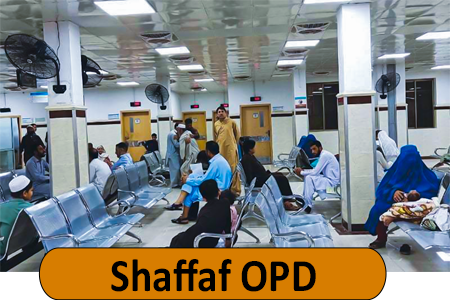
Impact of Free Outpatient departments (OPDs) Services:
Shaffaf Welfare believes that good care and prompt treatment are essential for the patient to recover more quickly. An important first step in any medical treatment is the outpatient department. It aids in the patient’s recovery from or improvement of a certain medical condition. The OPD is the area that offers extra services including diagnosis, lab work, safety tips, etc. It prevents the spread of infectious diseases and aids procedures like immunization, among others. Although the outpatient department serves many useful purposes, the facilities and level of care vary from institution to hospital. Therefore, take cautious to read the hospital’s reviews before visiting any Outpatient Departments (OPDs).
Offering free Outpatient Departments (OPDs) services can have a profound impact on several aspects of healthcare, societal wellbeing, and the economy:
Increased Access to Healthcare: Free services can significantly improve access to healthcare, especially for low-income individuals and families who might otherwise forego necessary care due to cost concerns.
Preventive Care and Early Detection: Free OPD services can also promote preventive care and early detection of diseases, as people are more likely to undergo routine checkups and screenings if they’re free. Early detection can lead to better health outcomes and can also be cost-effective in the long term, as it’s typically cheaper to treat diseases in the early stages.
Reduced Hospital Admissions: Providing free outpatient care can help manage chronic conditions effectively, reducing the need for hospital admissions. This not only frees up resources in hospitals but also lowers the overall cost of healthcare.
Improved Public Health: By making healthcare more accessible, free OPD services can lead to overall improvements in public health. This is particularly true for communicable diseases, where providing free access to healthcare can help prevent the spread of the disease.
Economic Impact: While offering free services can lead to increased healthcare utilization, which has an upfront cost, it may save money in the long run by preventing severe illnesses that are costly to treat. Additionally, a healthier population can contribute more to the economy, reducing days missed from work and increasing overall productivity.
Health Equity: Free services can help to reduce health disparities by providing access to care for all individuals, regardless of their ability to pay. This contributes to a more equitable healthcare system.
However, it’s important to note that offering free services also poses challenges. It requires adequate funding, either from government sources or through private donations. If not managed properly, it could also lead to overutilization of services or strain on the resources of the healthcare providers. Therefore, while free OPD services can have numerous benefits, they need to be implemented in a thoughtful and sustainable way.
Free Outpatient Departments (OPDs) can play a pivotal role in ensuring equitable access to healthcare, particularly for economically disadvantaged populations. Here are several reasons why free OPDs are necessary for poor people:
Affordability: Healthcare can be expensive, and for poor people, the cost can be a significant barrier to accessing necessary care. Free OPDs make healthcare services affordable and within reach for everyone, regardless of their income.
Preventive Care: Many poor people may avoid preventive care due to cost, only seeking medical attention when their condition becomes severe. Free OPDs can provide routine check-ups and screenings, allowing for early detection and treatment of diseases, which are typically more cost-effective than late-stage interventions.
Management of Chronic Diseases: Chronic diseases require ongoing care and medication. For poor people, the cumulative costs of managing chronic conditions can be prohibitive. Free OPDs provide an avenue for consistent, cost-effective management of these conditions.
Health Equity: The disparity in healthcare access between different socioeconomic groups is a significant issue worldwide. Free OPDs can help to bridge this gap, ensuring that everyone, regardless of their economic status, has access to quality healthcare.
Public Health: Public health efforts, such as vaccination campaigns, disease surveillance, and education about communicable diseases, can be effectively implemented through free OPDs. This is particularly beneficial for poor populations, who might otherwise lack access to these services.
Economic Empowerment: A healthy population is essential for economic development. By providing free healthcare, poor people can lead healthier, more productive lives, enabling them to improve their economic situation.
Reduction in Hospitalization: By providing access to primary and preventive care, free OPDs can help to reduce unnecessary hospitalizations and emergency room visits, which are often more expensive and could be financially devastating for poor individuals.
In essence, free OPDs can be a critical component of a comprehensive strategy to improve health outcomes, reduce health disparities, and promote health equity. However, it’s important to ensure that these services are adequately funded and managed to maintain their sustainability and effectiveness.
Our Mission:
Is to ensure that every member of our community, regardless of their financial means, has access to the healthcare they need. To achieve this, we strive to keep our OPD services free of charge, but we face a significant challenge in terms of funding this initiative. We are thus reaching out to you with a humble request for a donation. A contribution from you can make a substantial difference to our services. Your generosity would help us to improve our infrastructure, procure necessary medical equipment, and ensure that we continue to offer quality healthcare services to all our patients.
Our Outpatient Department (OPD) has been a cornerstone of our operations. However, in recent years, we have experienced an unprecedented increase in patient visits, which has pushed our existing resources to their limits and necessitated the need for substantial renovation and upgrade.
The present condition of our OPD Centre has begun to impair our healthcare professionals’ capacity to provide efficient and effective services. The space is now overly congested, and the deteriorating infrastructure and outdated medical equipment make it challenging to cope with the steadily growing influx of patients.

